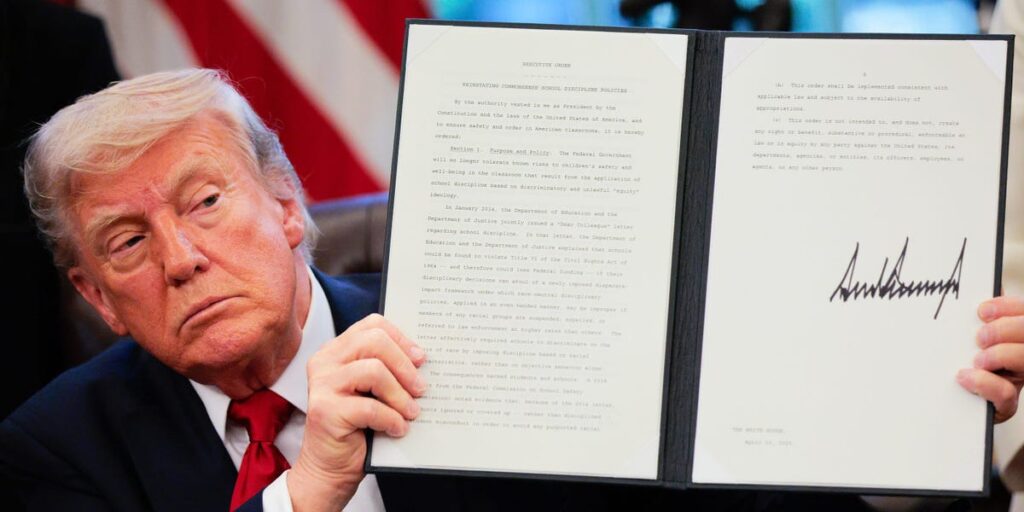A federal judge appeared poised to hand Big Law another win after he snapped Monday at a Justice Department lawyer attempting to justify President Donald Trump’s executive order targeting one firm.
During Monday’s court hearing, Richard Lawson, the Justice Department attorney, argued that Trump’s order could not possibly be illegal because it required federal agencies to act “consistent with applicable law.”
Lawson appeared to struggle through arguments, at times not giving direct responses to questions from the judge.
Lawson said Trump could target Jenner & Block, the Big Law firm, because the president said “Jenner discriminates against its employees based on race” — even though no court or government agency had come to that conclusion.
“Give me a break,” US District Judge John Bates snapped, as Lawson said federal agencies should be allowed to follow the order because the firm engaged in “racial discrimination.”
The oral arguments, in a Washington, DC, federal court, were part of Jenner & Block’s lawsuit seeking to permanently block Trump’s March 25 executive order targeting the firm. Bates previously ordered the federal government to pause the implementation of Trump’s order.
Jenner & Block, represented by the elite law firm Cooley LLP, is one of four firms that sued the government seeking to stop Trump’s executive orders. Nine other Big Law firms all made deals with Trump, collectively promising nearly $1 trillion in pro bono work, to avert orders targeting them.
Federal judges have swiftly issued temporary restraining orders preventing the executive orders from going into effect.
‘A pretty strange reading’
Bates, an appointee of former President George W. Bush, appeared impatient Monday as he questioned Lawson over the legal basis for Trump’s order.
Trump, in the first section of the order, said he targeted Jenner & Block in part because the firm previously hired a lawyer who worked for former Justice Department Special Counsel Robert Mueller, among other reasons.
The order would strip Jenner & Block employees of security clearances, cancel any contracts with the firm and its clients, and ban all employees from government buildings and from meeting with government officials.
“Ordering guidance specific to Jenner & Block that limits access to federal buildings, access to federal employees, access to federal agencies — the rationales in Section One that warrant that are what? Are what?” Bates asked Lawson.
In court filings and in Monday’s hearing, Lawson has argued that judges should give broad leeway to Trump’s power to target people and companies through executive orders, especially for purported national security issues.
Lawyers for Jenner & Block say the order is effectively government retaliation for free speech, violating the First Amendment. They also say Trump’s order would their clients’ right to counsel, as well as Jenner & Block’s obligation to advocate on behalf of their clients without government interference.
The law firm argues that the order would also effectively kick several Jenner & Block lawyers out of their military reserve service because that service depends on their having security clearances.
Lawson said federal agencies would review security clearances on “an individual-by-individual basis” rather than issuing a blanket suspension of everyone at the firm to remain “consistent with applicable law.”
Bates said he found that to be “a pretty strange reading” of the executive order.
“You think an agency official, given this executive order, is going to say, ‘Well, I’m going to do a person-by-person analysis to decide whether I will suspend the security clearances of these seven Jenner people subject to my agency,'” the judge asked incredulously. “Is that what you think?”
Bates also reserved sharp questions for Jenner & Block’s attorney, Michael Attanasio, during the hearing.
He asked whether it was necessary to strike down the entire executive order, or just the parts that directly harmed the law firm.
Attanasio asked the judge to issue a permanent injunction against the entire order, much like Trump withdrew the executive order he issued for Paul Weiss, which struck a deal with the president. The lawyer said Trump issued the order against Jenner & Block as “retribution.”
“It was set up to be one form of punishment, and it should be taken down the same way, just as the President did for Paul Weiss,” Attanasio said. “The difference being this time it gets taken down not on bended knee, but because this court enforces the constitution.”
Bates said a written opinion in the case was “forthcoming.”


